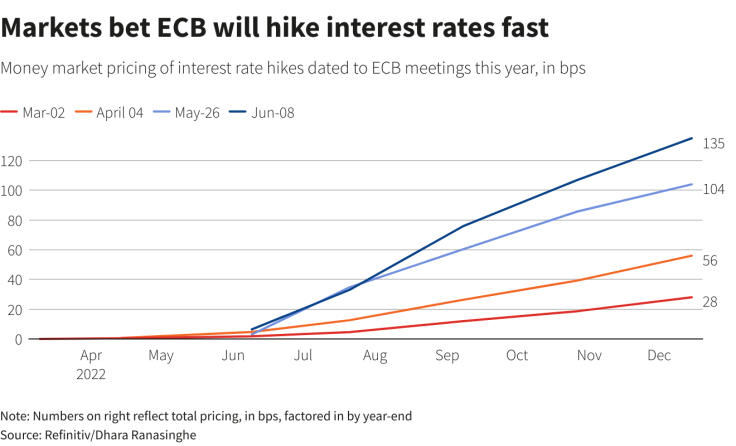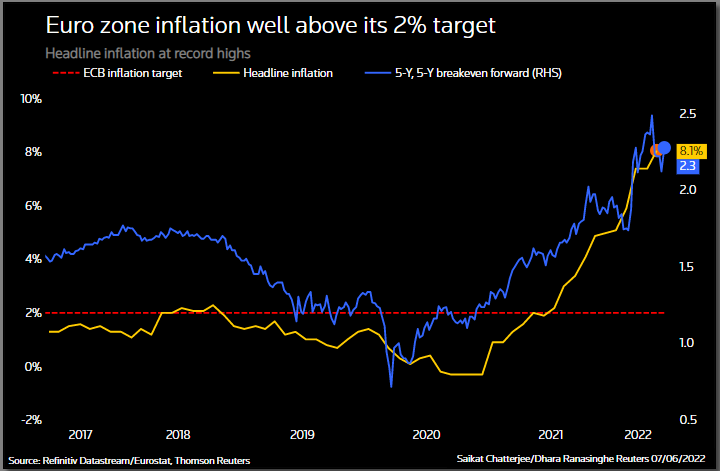Euro Stays Grounded As ECB Give 'Lift-off' Signal

Benchmark European borrowing costs hit an 8-year high on Thursday but the euro and stocks stayed firmly grounded as the European Central Bank signalled it will hike euro zone interest rates for the first time in a decade next month.
Along with a 20-year low for the Japanese yen there was little else worth focusing on. How fast the ECB would lift euro zone rates off zero has dominated attention for months, coming as part of the most widespread tightening of global monetary policy in over two decades.
Bond dealers marked the moment by pushing Germany's 10-year government bond yield - the main proxy for European borrowing rates - to its highest level in nearly eight years at 1.41%. Stocks began to slip again. The euro barely budged.
With euro zone inflation at a record-high 8.1% and broadening quickly, the ECB had already flagged a series of moves, including ending its long-running asset buying programme at the end of this month. Details were crucial though.
It spelled out that it plans to raise rates a quarter point next month and probably half a point again in September, which would be the first 50-basis-point move in 22 years.
"A rate rise in July and in the Autumn is already baked in," said Close Brothers Asset Management's Chief Investment Officer Robert Alster, adding that the ECB was relatively late to the rate hike "party".
"We do not expect more aggressive tightening whilst the war in Ukraine continues to weigh on sentiment."
The ECB also published new forecasts that raised its inflation projections to 6.8% for this year from 5.1% previously but it cut its growth outlook to 2.8% from 3.7% due to the impact of sky-high energy and food prices.
Graphic: Markets bet ECB will hike interest rates fast -

As the ECB's post-meeting new conference began, small but broad-based losses in European stocks were led by miners as China imposed new COVID lockdown measures in Shanghai, while the financials sector fared marginally better with banks soon able to charge higher lending rates.
Asian stocks had fallen overnight and Wall Street futures were broadly flat[.N], although it was more to do with the renewed rise in both global bond yields and the dollar, which will ultimately mean tighter financial conditions.
MSCI's broadest index of Asia-Pacific shares outside Japan was closing down 0.5%, with Australian shares finishing down 1.4% and Seoul's KOSPI flat. Hong Kong's Hang Seng turned around from small gains to fall 0.7% and Chinese A-shares fell 1%.
"It's classic pre-central-bank-meeting price action," Matt Simpson, senior market analyst at City Index in Sydney, said.
"It's the most exciting meeting since (Christine Lagarde) has been at the helm, since Draghi was here - 'whatever it takes'," Matt Simpson, senior market analyst at City Index in Sydney, said referring to the ECB meeting.
YEN LOWS
The other major focus for global investors was on the backsliding Japanese yen, which dropped to a 20-year low against the dollar of 134.56 before regaining a little ground. It is also nearing crucial levels against China's yuan which are highly sensitive for Asia.
The Japanese currency has been weighed down by a widening policy divergence, with the Bank of Japan remaining one of the few global central banks not signalling higher interest rates at present.
The global dollar index, which is up nearly 7% this year, was holding steady at 102.38, and the euro was at $1.0738 and testing 1.05 against the neighbouring Swiss franc.
The U.S. 10-year yield ticked up on Thursday to 3.0585% from a U.S. close of 3.029% on Wednesday and the two-year yield climbed to 2.815% compared with a U.S. close of 2.774%.
Adding to concern over European inflation, data this week showed the euro zone economy grew much faster in the first quarter than the previous three months, despite the war in Ukraine.
As investors digest the size and pace of ECB tightening in the coming months, they are also awaiting U.S. consumer price data on Friday which the White House has said it expects to be "elevated". Economists expect annual inflation to be 8.3%, according to a Reuters poll.
Oil prices were hovering near three-month highs at an eye-watering $123 a barrel in the commodity markets. On Wednesday, the Dow Jones Industrial Average fell 0.81%, the S&P 500 lost 1.08% and the Nasdaq Composite dropped 0.73%.
"Over the last two weeks, trading has been in a very narrow range and also based on very low volumes," analysts at ING said in a note.
"Previous instances of this range trading on low volumes have usually preceded a sharp down-shift," they cautioned, adding that the ECB meeting and Friday's U.S. price data were likely "catalysts for a more bearish outlook".
Graphic: Euro zone inflation is at record highs -

© Copyright Thomson Reuters {{Year}}. All rights reserved.




















